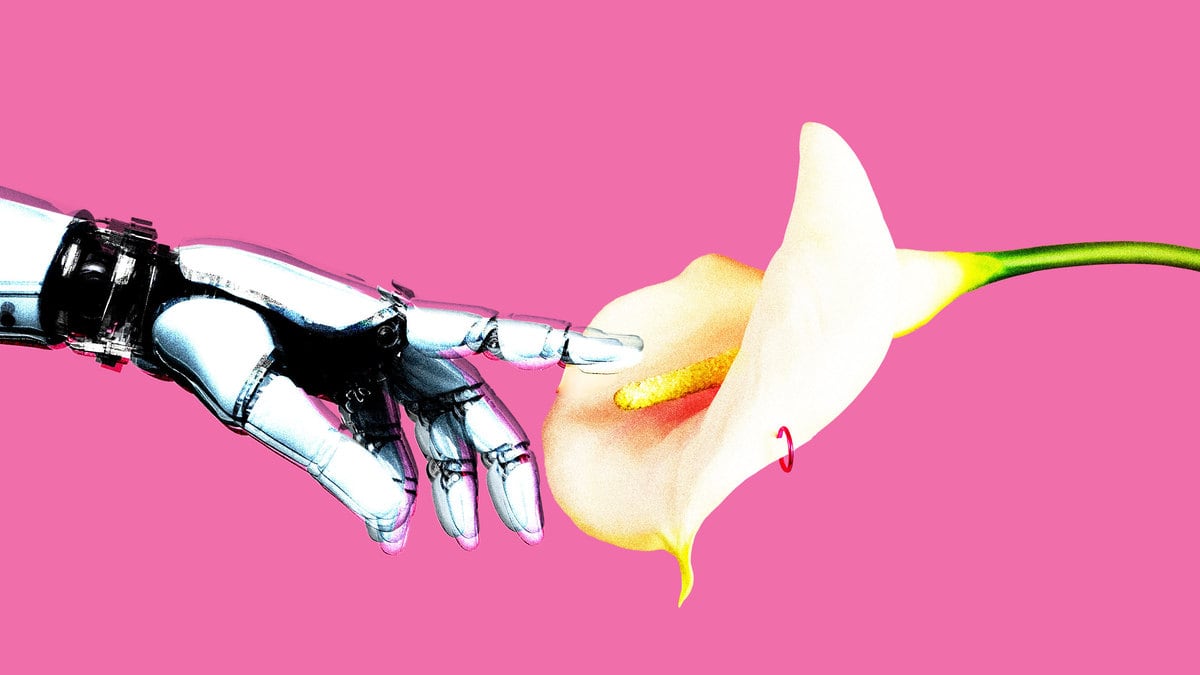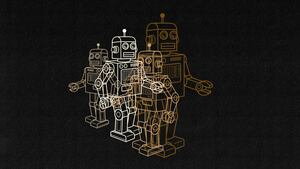Coralyn Jewel smiles broadly at the camera, as strands of her jet-black hair fly up with the breeze. Her motorcycle jacket shows off her jutting breasts and flat stomach, while four lightning strikes shine brilliantly in the background. Upon first glance, the image appears fairly unremarkable—just another over-stylized modeling shoot. Look closer, though, and the cracks begin to show: a black shadow in her cleavage looks like a chasm, her belly button is large and strangely diamond-shaped, and her hair is oddly gravity-defying.
The image of Jewel, a human adult performer, is from DeepFake.com—but unlike most deepfakes, it’s an authorized one. Jewel created it herself using the site’s image-generating software that was trained from about 100 images she shared with Steve Lightspeed, founder of DeepFake.com. Initially, she was skeptical of creating deepfakes.
“Part of me is like, ‘Oh my God, that's so scary,’” she told The Daily Beast. Now she posts some of the images from DeepFake.com to her social media. “People are like, ‘Holy crap, that really does look like you.’”

Coralyn Jewel created this image using DeepFake.com's image-generating software that was trained from about 100 images she shared with the site.
Coralyn Jewel/DeepFake.comJewel thinks AI images might be good for her bottom line as they will direct more people to her website, where she can sell them exclusive pictures and videos. Still, she’s worried the AI images will become more popular than her flesh-and-blood self—though she said her fans reassured her that “we still like the real Coralyn because there’s a personality.”
Jewel is a rarity on DeepFake.com. That’s because most of the roughly 150,000 users on on the website are not porn actors but fans creating custom images of women to their specifications. Options might include prompts like big hips, space suit, steampunk, large boobs, or Jewish.
While Jewel and some other performers view AI images as a new revenue stream, others are skeptical—and some even fear that AI could make online sex work a lot less profitable. There’s also the question of consent: About 96 percent of deepfakes are nonconsensual pornography, according to a 2019 study by cybersecurity firm Deeptrace Labs. This makes for a perfect storm of labor issues within sex work mixed with the enormous ethical problems surrounding the technology. Creating authorized deepfakes could be one solution—but it certainly won’t solve the problem.
Adult performers are particularly vulnerable to AI and impersonation because their jobs involve selling images of themselves. Fifty-eight percent of adult creators have been the victims of online impersonation, according to a study by NSFW content creator platform My.Club. The union for adult creators, the Adult Performance Artist Guild (APAG), has been watching the Screen Actors’ Guild (SAG-AFTRA) union’s strike closely, citing parallels between Hollywood and the adult industry.
For example, SAG-AFTRA said that background actors were being asked to sell the rights to the AI rendering of themselves for a day rate of $180. The same thing is happening in the porn world too with some APAG members being asked to sign away the rights to an AI image of themselves for as little as $150.
“I'm so excited to see the rest of the world in an uproar [over this],” Alana Evans, president of the APAG, told The Daily Beast. “Yes, let's cry for the mainstream actors who deserve their pay. I am absolutely there for that. But goddamn it, stop pretending that the people in porn are not human beings—that we're not being exploited 10 times worse.”
Laws have not caught up to deepfake technology either. According to professor Kristjan Kikerpill, author of Choose Your Stars and Studs: The Rise of Deepfake Designer Porn, it’s unlikely that they will anytime soon. “The general rules on copyright were in place long before the internet became a thing, yet the existence of such rules did not stop… online piracy,” he told The Daily Beast. “Digital content moves faster than rules and enforcement.”
However, many performers consider AI a boon to their work lives. Jessica Moore, a Canadian OnlyFans model, told The Daily Beast she uses AI every day, from ChatGPT for her messages to her fans to realistic avatars of herself featuring a “clone” of her voice. “It’s your voice and your likeness doing your work without you actually having to do the physical work,” she said.
Evans agreed, saying that AI is an improvement over the chat companies some performers are outsourcing the work to. She notes that creators aren’t aware if the workers are being trafficked or not, and they’re also likely women being paid low wages overseas with “some man running their shifts.”
But do fans care whether they’re talking to AI or an actual human? It’s hard to know. MelRose Michaels has had fans accuse her of being AI in the DMs. “I'll send them a voice message and be like, ‘No, bro. This is me,’” she said. “I think that the biggest thing that fans want from the creators is just transparency.”
Some companies like My.Club, an OnlyFans-like platform, think fans do care. Earlier this year, My.Club introduced a face verification system to verify that creators are who they say they are. It’s similar to face verification on an iPhone, but with additional levels of security like anti-spoofing tech to catch whether someone is using a picture to impersonate a creator, and staff members who review people’s faces. The site has had over a million users in verified traffic, a much smaller user base than OnlyFans’ 210 million users.
However, Evans doesn’t think more face verification is a good idea because of bias—something that AI has a long and sordid history with. There was the time Google Photos tagged Black users as gorillas. More recently, an Asian American MIT student asked an AI to make a photo of her more “professional,” which resulted in it making her look white.
“Face scans do not work well on people of color,” she notes. “Black performers have the hardest time getting their pages approved [on OnlyFans] with these face scans. It’s a nightmare. You can’t [cash out] because they won’t approve your face.”
AI image generators are only as good as the pictures being fed into them. Although they represent a vision for the future, they are by necessity a reflection of the past because they create new images by being fed old ones. That means when it comes to sexual imagery AI image generators are great at replicating the heterosexual male gaze.
“Almost every model is good at female breasts,” one erotica writer who spoke to The Daily Beast on the condition of anonymity, said. He uses AI image generators like Stable Diffusion to create covers and images for his stories and novels. In his experience, he’s found that AI is a lot like the people who label the images: racist and sexist.
For example, whenever the erotica writer types in “slave” to get a BDSM scene, he said he gets images of Black people. “Similarly, if you want someone in a school uniform, you’re gonna get Japanese girls,” he said.
While there are some obvious issues with using AI to generate explicit content and art, he adds that he believes the fears around AI porn images are overblown. “Anyone with a pen and some art skill has always been able to draw a naked picture of a real person,” he said. “And I don’t think anything has fundamentally changed with AI except that the barrier to do it has gone down slightly. That doesn’t mean there’s not still a problematic issue there.”
As AI becomes more advanced and commonplace, sex workers and other NSFW content creators will have to continue to grapple with these tools and, ultimately, learn how to live and earn money alongside these new technologies. For her part, Michaels believes both AI and humans will have their place because the two will appeal to different audiences. Some people don’t care about talking to a human, but for those that do, she thinks AI will put her at an advantage.
“I foresee that in the future, I will be able to sell what I do at a higher price point, because a human is a premium,” she said.
Still, worries remain that clients might stop paying for content starring humans—leaving performers out of jobs. However, Lightspeed contends this worry is overblown and that AI will only augment performers’ careers, not destroy their livelihoods. “[AI] will only replace them when they want to retire,” he said.
He might have a point. Performers, particularly women, face rampant ageism; once they hit 30 they are slotted into the MILF category and it’s not long after that they’re characterized as GILFs and their careers can sputter.
With deepfakes and AI more broadly, there’s a chance that these performers can effectively remain young forever—creating content, images, and even videos to extend the lifespan of their career well into the future. Moreover, it could provide these performers a chance to have more flexibility and control over their image in a way they might not necessarily have had before.
“Now maybe there is an exit strategy to this industry where I can actually go offline, go live my life and still make money,” Lightspeed said. “And that, to me, is very enticing.”









